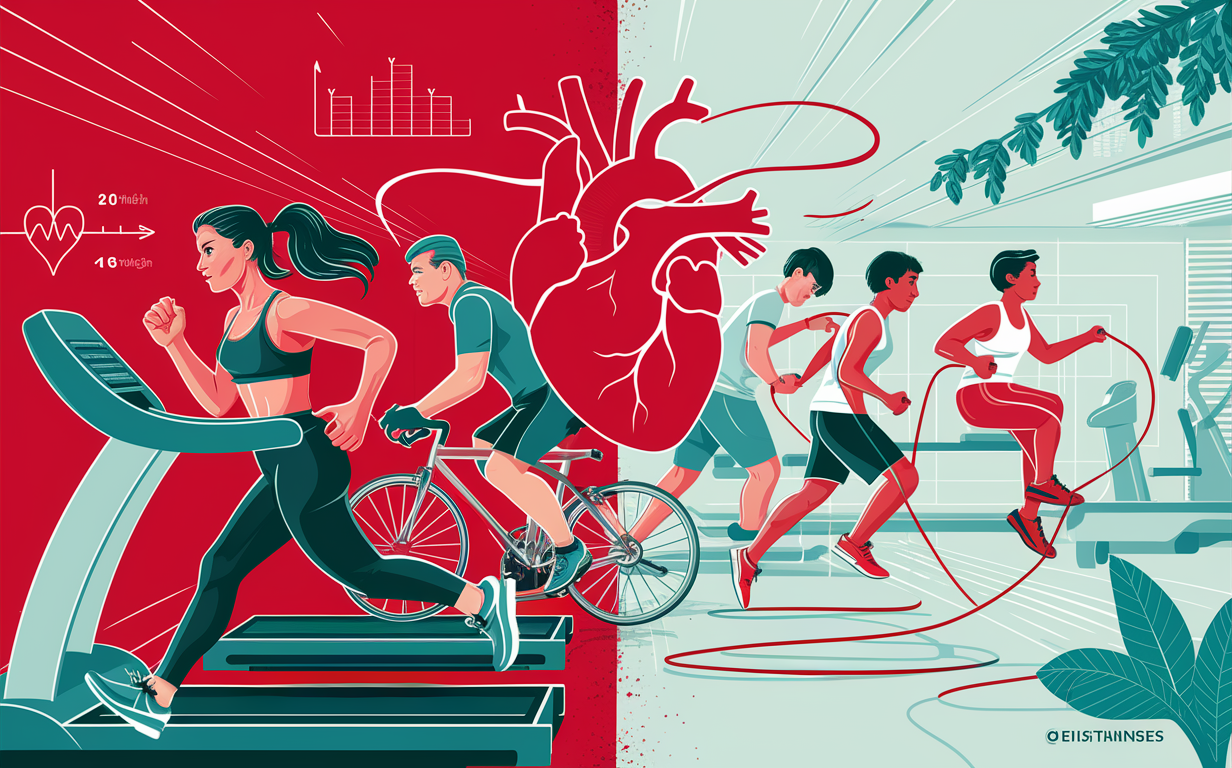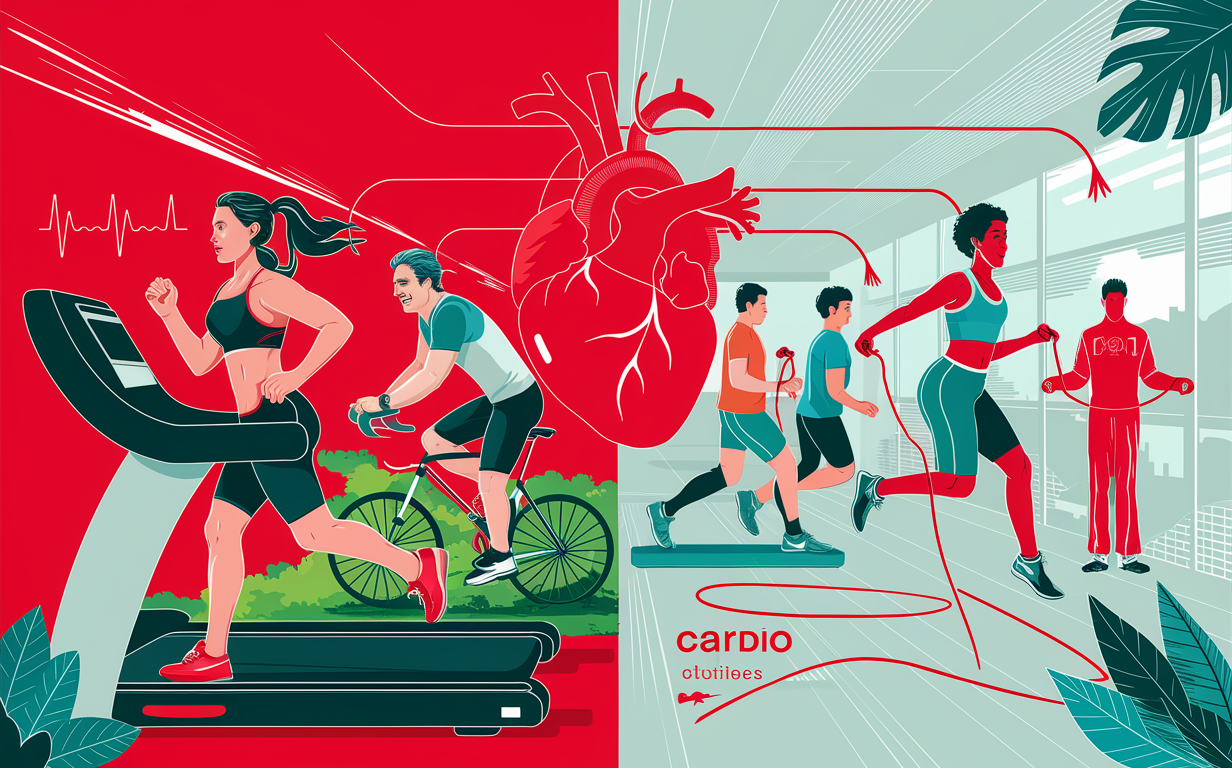
Jul 19 2024
Optimize Your Cardio: Strategies for Effective Heart Health
Cardio optimization isn’t just for athletes or fitness enthusiasts; it’s essential for anyone looking to improve their overall health and longevity. Understanding how to maximize your cardiovascular fitness can lead to numerous benefits, including increased energy levels, better mental health, and a more robust immune system. In this article, we’ll break down the best practices for optimizing your cardio routine, based on data-driven insights and real-life experiences.
Key Takeaways
- Cardio optimization directly impacts heart health, stamina, and overall well-being.
- Structuring your cardiovascular routine effectively can yield better results.
- Integrating variety and consistency is critical for maintaining an optimized cardio routine.
- Monitoring heart rate and performance metrics can help fine-tune your workouts.
- Personalized nutrition and mental resilience play a significant role in optimizing cardio performance.
Understanding Cardio Optimization

Cardio optimization refers to the strategic planning and execution of cardiovascular exercises to achieve maximum benefits for heart health and fitness. This approach ensures that your efforts translate into tangible health improvements, whether your goal is weight loss, endurance, or overall well-being.
The Importance of Cardiovascular Fitness
Cardiovascular fitness is crucial because it affects how efficiently your heart, lungs, and circulatory system function. Improved cardiovascular health can lead to reduced risks of chronic diseases, such as hypertension, diabetes, and heart disease.
Setting Realistic Goals
When starting a cardio routine, it’s vital to set achievable goals. Whether it’s running a certain distance, completing a number of sessions per week, or maintaining a specific heart rate, having clear objectives can keep you motivated and on track.
Effective Cardio Workouts for Optimization

High-Intensity Interval Training (HIIT)
HIIT involves short bursts of intense exercise followed by rest or low-intensity periods. This method has been shown to improve cardiovascular fitness more efficiently than steady-state cardio. For example, alternating between 30 seconds of sprinting and 1 minute of walking for 20 minutes can significantly boost your heart health.
Steady-State Cardio
Steady-state cardio involves maintaining a consistent, moderate intensity over a longer period. Activities such as jogging, cycling, or swimming for 30-60 minutes can improve your aerobic capacity and endurance.
| Exercise Type | Duration | Intensity Level | Benefits |
|---|---|---|---|
| HIIT | 20 mins | High | Rapid improvement in fitness |
| Steady-State Cardio | 45 mins | Moderate | Enhanced endurance |
| Low-Intensity Cardio | 60 mins | Low | Improved fat burning |
Incorporating Varied Exercises
Variety is key to preventing plateaus and keeping your workouts engaging. Mixing different types of cardio exercises, such as rowing, elliptical training, and dancing, ensures comprehensive cardiovascular training.
Monitoring Progress

Heart Rate Zones
Understanding and training within specific heart rate zones can help optimize your cardio workouts. Here’s a quick breakdown of the zones:
- Zone 1 (50-60% of max HR): Warm-up and recovery
- Zone 2 (60-70% of max HR): Fat burning
- Zone 3 (70-80% of max HR): Aerobic training
- Zone 4 (80-90% of max HR): Improved VO2 max
- Zone 5 (90-100% of max HR): Peak performance
Using a heart rate monitor can help you stay within these zones and maximize the effectiveness of your workouts.
Performance Metrics
Tracking metrics such as distance, pace, and calories burned can provide insights into your progress and areas that need improvement. Apps and fitness trackers make it easy to monitor these metrics over time.
The Role of Nutrition in Cardio Optimization

Tailored Nutrition Plans
Proper nutrition fuels your workouts and aids in recovery. A diet rich in lean proteins, complex carbohydrates, and healthy fats can support your cardiovascular fitness goals.
| Nutrient | Sources | Benefits |
|---|---|---|
| Protein | Chicken, fish, legumes | Muscle repair and growth |
| Complex Carbs | Whole grains, vegetables | Sustained energy |
| Healthy Fats | Avocados, nuts, olive oil | Heart health and energy |
Hydration
Staying hydrated is crucial for maintaining performance and preventing fatigue. Water is essential, but electrolyte-rich beverages can be beneficial, especially for longer or more intense cardio sessions.
Supplements
In some cases, supplements such as BCAAs (branched-chain amino acids), omega-3s, and magnesium can support cardiovascular health and performance. However, it’s always best to consult with a healthcare provider before starting any supplement regimen.
Mental Resilience and Cardio Performance

Mental Thoughness
Mental resilience is often overlooked but is a critical component of cardio optimization. Developing a strong mental game can help you push through tough workouts and stay consistent.
Mindfulness and Stress Management
Incorporating mindfulness practices like meditation and deep breathing can help manage stress, which can otherwise hinder your cardiovascular progress. Reducing stress levels can lead to better sleep, improved recovery, and enhanced overall performance.
Setting a Routine
Creating a consistent workout schedule can make it easier to stick with your cardio routine. Whether it’s early mornings or late evenings, find a time that fits your lifestyle and commit to it.
Real-Life Success Stories

Sarah B.’s Cardio Journey
Sarah B. lost 80 pounds and transformed her life through a combination of tailored cardio workouts and personalized nutrition plans. By integrating HIIT and steady-state cardio into her routine, along with a balanced diet, Sarah not only shed weight but also gained confidence and improved her overall health.
John’s Quest for Endurance
John, a busy professional, found it challenging to incorporate cardio into his hectic schedule. By setting realistic goals and using heart rate monitoring, he managed to improve his endurance and cardiovascular health. John’s story is a testament to how effective planning and consistency can lead to significant health improvements.
Common Mistakes to Avoid

Overtraining
While it’s essential to challenge yourself, overtraining can lead to injuries and burnout. Ensure you incorporate rest days and listen to your body.
ask
Neglecting Warm-Ups and Cool-Downs
Skipping warm-ups and cool-downs can increase the risk of injuries. Always start with a light warm-up and end with stretching to maintain flexibility and prevent muscle soreness.
Ignoring Nutrition
Even the best cardio routine won’t yield results if not complemented by proper nutrition. Ensure your diet supports your fitness goals to see the best outcomes.
Personalized Cardio Plans

Tailored to Your Fitness Level
Whether you’re a beginner or an advanced athlete, your cardio plan should be tailored to your fitness level. Start with what you can handle and gradually increase the intensity and duration of your workouts.
Regular Assessments
Regular assessments can help you track progress and make necessary adjustments to your plan. Periodically reassess your goals and performance metrics to stay on the right track.
Flexibility and Adaptability
Life can be unpredictable, and your cardio plan should be flexible enough to adapt to changes. Having a variety of workout options can help you stay consistent, even when your schedule is tight.
Conclusion
Optimizing your cardio routine can lead to significant improvements in your overall health and well-being. By understanding the importance of cardiovascular fitness, setting realistic goals, and incorporating a variety of exercises, you can achieve a balanced and effective fitness plan. Remember to monitor your progress, fuel your body with the right nutrients, and build mental resilience to stay motivated and consistent.
Key Takeaway: A well-rounded approach to cardio optimization, including tailored workouts, proper nutrition, mental resilience, and progress monitoring, can lead to substantial health benefits and improved quality of life. Stay consistent and adapt your routine to fit your lifestyle for the best results.
Optimize your cardio routine today and experience the benefits of improved heart health and fitness!
